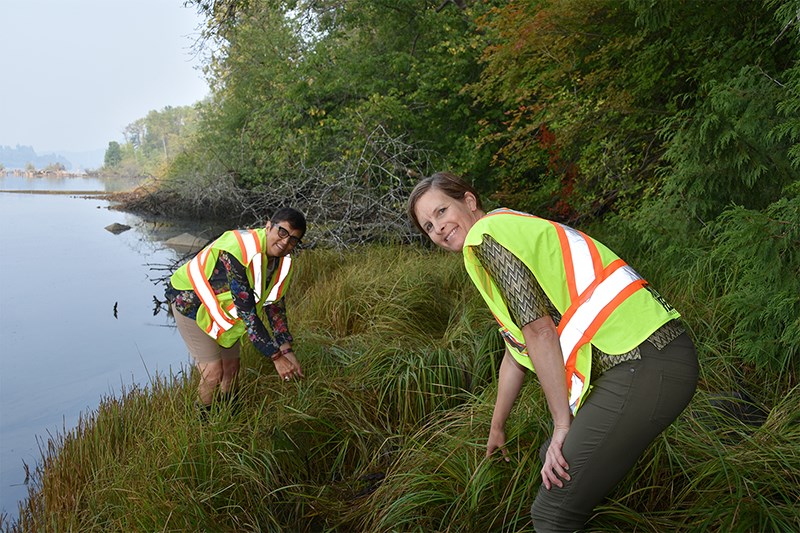Port Moody Inlet’s unique biodiversity is under siege.
But it’s not rampant pollution or over overpopulation that is in danger of killing the stunning array of fish, bug, bird and plant life.
In fact, it’s an innocuous-looking grass called Spartina that grows in thick clumps that could devastate the intertidal area.
Without intervention, this invasive species would take over the mud flat, threatening the nursery grounds for juvenile fish, decreasing habitat for shorebirds, and disrupting the ecology and function of the mudflats that are so important for the web of life.
Fortunately, an action plan headed up by the BC Spartina Working Group of federal and provincial agencies, cities and environmental organizations has been tackling this invasive species one clump at a time.
And in Port Moody, environment workers are seeing some progress in the eradication of Spartina patens, that has been identified growing in patches in the intertidal area next to the busy Shoreline Trail.
In one section, a brown mud patch is now the only sign that Spartina existed, thanks to the efforts of the working group and city workers who covered the grass a few years ago with a black tarp to stop photosynthesis and kill the grass.
“It’s a good sign, we’re not seeing any regrowth,” noted Leslie Douglas, general manager of environment and parks, who with environmental technologist Angela Crampton, took the Tri-City News on a tour around the inlet to check on the progress of the eradication program.
This week, the herbicide Imazapur will be applied to kill the roots, so the cord grass doesn’t grow back.
“It’s a very targeted approach done by certified pesticide applicators who are with Ducks Unlimited (a member of the working group),” Douglas said, adding further that the herbicide will be applied under provincial rules, on a dry day, at low tide when there is no wind.
By applying the tarp first, it is estimated that the need for herbicide treatment has been reduced by 60%.
“We want to make sure pesticide use is a last resort,” Douglas noted.
Getting rid of Spartina now is important, while it is still in small patches, so that it doesn’t get out of hand.
Unlike blackberry, an invasive species which has taken over the edges of forests and other lots, Spartina is still getting a foothold in Port Moody inlet, spotted a number of years ago by an alert kayaker. Efforts now should pay off in the future, with the eradication program extended to Pacific Coast Terminals and Reed Point Marina a few years ago, as well as North Vancouver.
The working group is also tackling other species of Spartina that are threatening intertidal marshes in the Fraser River delta, and on Vancouver Island.
Left uncontrolled Spartina would spread across thousands of hectares, up from 22 hectares (54 acres) currently identified, leading to a loss of ecological diversity, including migratory bird habitat, as has occurred in Washington and California.
And a study found that ocean currents could cary Spartina seeds and root fragments all along B.C.s coastline, putting 27,000 km of coastline at risk.
“Invasive species don’t recognize jurisdictional boundaries,” Douglas said, adding later, “If we let it grow, it will impact our fish, plants, birds, and invertebrate species that depend on the intertidal zone.”
• A sign outlining the Spartina eradication program has been placed along the Shoreline Trail.



